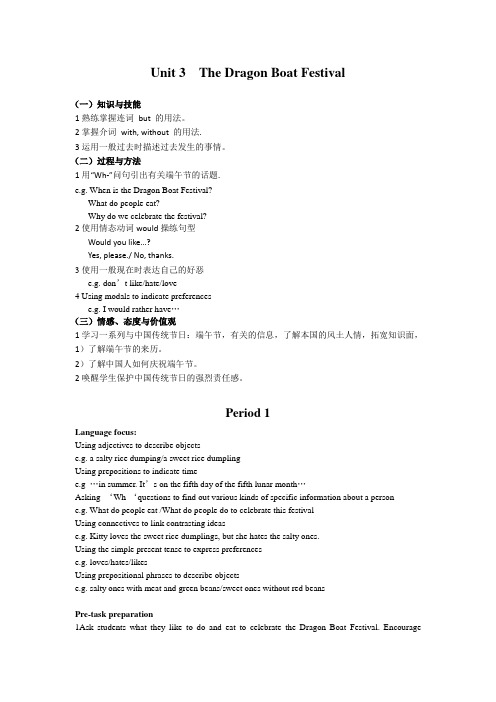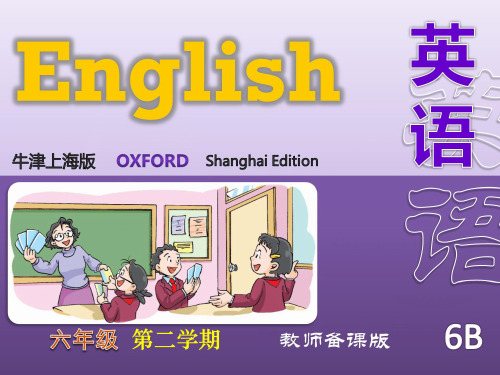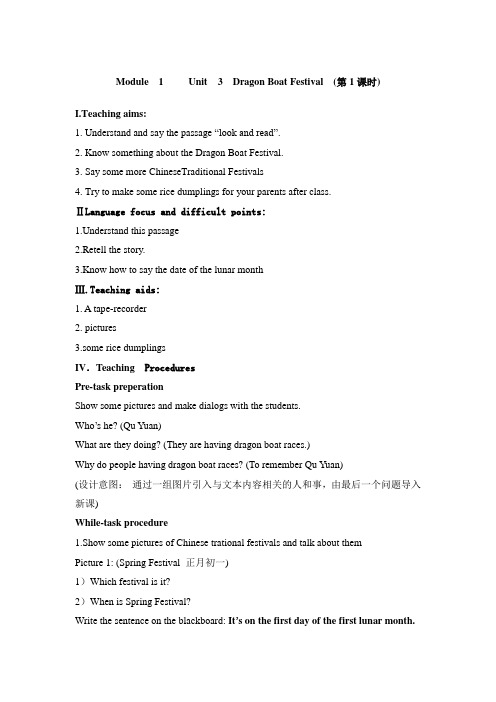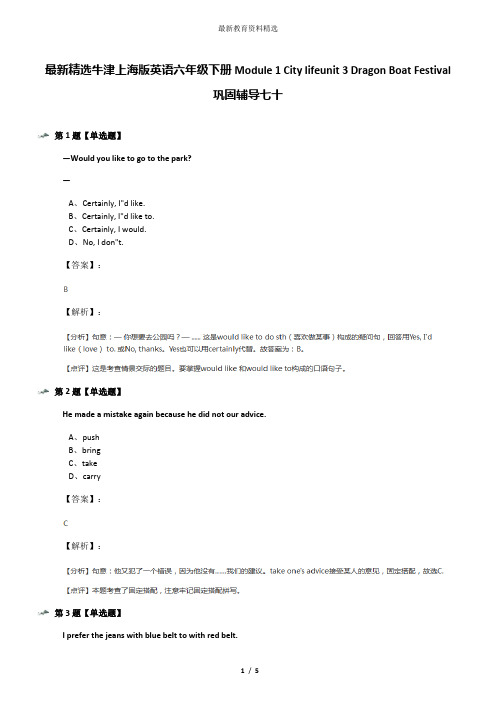六年级下册英语同步拓展Module1 Unit 3 Dragon Boat Festival介词 牛津上海版(一起)
牛津英语上海版六年级下册6B Module 1 Unit 3 The Dragon Boat Festival 4课时教案附反思

Unit 3 The Dragon Boat Festival(一)知识与技能1熟练掌握连词but 的用法。
2掌握介词with, without 的用法.3运用一般过去时描述过去发生的事情。
(二)过程与方法1用“Wh-”问句引出有关端午节的话题.e.g. When is the Dragon Boat Festival?What do people eat?Why do we celebrate the festival?2使用情态动词would操练句型Would you l ike…?Yes, please./ No, thanks.3使用一般现在时表达自己的好恶e.g. don’t like/hate/love4 Using modals to indicate preferencese.g. I would rather have…(三)情感、态度与价值观1学习一系列与中国传统节日:端午节,有关的信息,了解本国的风土人情,拓宽知识面,1)了解端午节的来历。
2)了解中国人如何庆祝端午节。
2唤醒学生保护中国传统节日的强烈责任感。
Period 1Language focus:Using adjectives to describe objectse.g. a salty rice dumping/a sweet rice dumplingUsing prepositions to indicate timee.g …in summer. It’s on the fifth day of the fifth lunar month…Asking ‘Wh-‘questions to find out various kinds of specific information about a persone.g. What do people eat /What do people do to celebrate this festivalUsing connectives to link contrasting idease.g. Kitty loves the sweet rice dumplings, but she hates the salty ones.Using the simple present tense to express preferencese.g. loves/hates/likesUsing prepositional phrases to describe objectse.g. salty ones with meat and green beans/sweet ones without red beansPre-task preparation1Ask students what they like to do and eat to celebrate the Dragon Boat Festival. Encouragestudents to talk about this festival.2Review and introduce new vocabulary items in Look and learn.3Play the recording: Look and learn and Look and read. Students listen and follow in their books. 4Play the recording again. Students listen and repeat.While-task procedure1Students pair up to talk about the rice dumplings they like. Have them complete the survey form in Circle and write by circling and writing down what they have discussed with their partners. They are required to use the target language in their report, like this: I love…, but I hate …/My classmate loves…, but …/We both love…, but…2Ask individuals to read their reports to the class.3Collect all reports and bind them into a book for circulation in class.4Conduct a simple survey to find out the most popular kind of rice dumpling among students by counting how many students like a particular kind of rice dumpling. Ask some students why they like or dislike a particular kind of rice dumpling.ConsolidationGrammar Practice Book 7A pages 9 and 10Period 2Language focus:Asking ‘wh-‘questions to find out the reasone.g. Why do we celebrate the Dragon Boat FestivalUsing the simple past tense to talk about past activities and statese.g. Qu-yuan was born around two thousand years ago in China.Using the simple present tense to talk about present statese.g. Nowadays, people eat rice dumplings and have Dragon Boat races to …Pre-task preparationLanguage learning activity(This section aims at providing students with opportunities to practise the language/vocabulary needed or become familiar with the background for the task that follows.)1 Give students some time to read the story silently. Then ask students: Was Qu-yuan sad Why Encourage volunteers to answer the questions.2 Play the recording: Look and read. Students listen and follow in their books.3 Play the recording again. Students listen and repeat. Ask students to pay attention to the pronunciation and intonation of the words4 Remind students of the use of the past tense in the story .Go over the verbs in the past tense with students. Invite the more able students to speak out and spell, if possible, the corresponding verbs in their present tense form.5 Remind students to pay attention to the use of different tenses when talking about the past and the present in the story.6 Distribute a copy of photocopiable page 8 to each student. Students read the text on page 11 ofthe Student’s Book again individually. Have them complete the list and write down the answers to the questions.7 To check the answers with students, invite some students to write the list on the board. Then invite the more able students to answer the questions orally.ConsolidationGrammar Practice Book 7A pages 12Period 3Language focus:Using modals to make an offere.g. Would you like a piece of rice dumplingUsing formulaic expressions to accept offerse.g. Yes, please. I really like rice dumplings.Using formulaic expressions to decline offerse.g. No, thanks. I don’t like rice dumplings very much.Using modals to indicate preferencese.g. I’d rather have a piece of pizza.Pre-task preparationLanguage learning activity(This section aims at providing students with opportunities to practise the language/vocabulary needed or become familiar with the background for the task that follows.)1 Review the names of the food and drink items that students have learned previously, e.g. pizza, pancake, cookies, hamburger, lemonade, 7-UP, coffee, etc. Introduce new food items, e.g. Chinese pudding, Christmas pudding with the help of pictures or photos.2 Play the recording: Look and say. Students listen and follow in their books.3 Students work in groups of three and use the modeled conversation in About you to do the role-play. Have some groups come out and act the conversation.ConsolidationGrammar Practice Book 7A Page 13Period 4Language focus:Using formulaic expressions to begin and end a lettere.g. Dear _____/Yours,Using the simple present tense to express interestse.g. don’t like/hate/loveUsing prepositions to describe objectse.g. I hate the sweet ones with/without…Using modals to indicate preferencese.g. I would rather have…Pre-task preparationReview the format of a letter with students. Tell students that a letter should include the date, receiver’s name and address, greeting, body, complimentary close and writer’s signature. Remind students that there are different letter formats and that it is acceptable to indent the paragraphs.While-task procedure1 Have students look at Think and write on Page 13 of the Student’s Book. Students are required to complete the letter to a pen-friend, telling him/her about the Dragon Boat Festival. Remind them they also have to read pages 10 and 12 of the Student’s Book again in order to find all the relevant information.2 When the students have completed their letters, invite a few more able student to read their letters aloud.ConsolidationGrammar Practice Book 7A page 15NOTES: (单元教后记)本单元通过学习一系列与中国传统节日:端午节,有关的信息,了解本国的风土人情,拓宽知识面,唤醒学生保护中国传统节日的强烈责任感。
Dragon Boat Festival 端午节(牛津英语 六年级下册 M1U3)

Later, the new king / lost a battle because lose / // he did not take Qu Yuan’s advice. The lost country was in danger. / // Qu Yuan was very sad. / He jumped into a river and died. It was the fifth day of the fifth lunar month of that year.
C
Read and find out
Answer Read and write
PIGGY BANK
GOLD MINE
Look and match
Do you know these festivals? / / 1 2 3
2-1
4
5
6
C
PIGGY BANK
GOLD MINE
2-2
1
1
2
3
C
PIGGY BANK
GOLD MINE
3-2
How can we write the scripts?
1 The narrator should introduce the scene. 2 Each character in the story should write their own words. 3 You are preparing for the short play, so your scripts should be easy to read and act out. 4 Use short sentences. 5 Use body language to make your play interesting.
Module1Unit3DragonBoatFestival1_20120302083507781

Module 1 Unit 3 Dragon Boat Festival (第1课时)I.Teaching aims:1. Understand and say the passage “look and read”.2. Know something about the Dragon Boat Festival.3. Say some more ChineseTraditional Festivals4. Try to make some rice dumplings for your parents after class.ⅡLanguage focus and difficult points:1.Understand this passage2.Retell the story.3.Know how to say the date of the lunar monthⅢ.Teaching aids:1. A tape-recorder2. pictures3.some rice dumplingsIV.Teaching ProceduresPre-task preperationShow some pictures and make dialogs with the students.Who’s he? (Qu Yuan)What are they doing? (They are having dragon boat races.)Why do people having dragon boat races? (To remember Qu Yuan)(设计意图:通过一组图片引入与文本内容相关的人和事,由最后一个问题导入新课)While-task procedure1.Show some pictures of Chinese trational festivals and talk about themPicture 1: (Spring Festival 正月初一)1)Which festival is it?2)When is Spring Festival?Write the sentence on the blackboard: It’s on the first day of the first lunar month.Students learn to say this sentence.3)What do people do on Spring Festival?(生自由回答)Picture 2 (The Lantern Festival 正月十五)Picture 3 (The Mid Autumn 八月十五)Students choose one festival and talk about it in groups.2.Show some pictures and introduce the story of “Look and read”.3.Look at the picture and answer the question:When was Qu Yuan born?4.Listen to the recording of “loo k and read” and circle the new words.5. Show the cards of the words ,read them one by one.celebrate, advice, country, lunar, remember6. Play the recording and the students repeat7.Read the story in groups and then let some volunteers read the story.8.Answer the questions about the story:1)What was Qu Yuan’s job?2) What did he do when his country was in danger?3)When is Dragon Boat Festival?4) How do people remember Qu Yuan?(设计意图:通过多种形式理解并能较熟练的朗读课文)Post-task1.Look at the pictures and retell the story.2.Talk about some Chinese Trational Festivals by answering these questions:1)en is Dragon Boat Festival?/ Spring Festiva/ The Lantern’s Festival/ the Mid Autumn?2)What do people eat on those days?3)What do people do on those days?Homework:1.Listen and read “Look and read at homework”.2.Lean to make some rice dumplings.3.Find out some more Chinese trational festivals.。
【教育资料】六年级下册英语同步拓展Module1 Unit 3 Dragon Boat Festival介词 牛津上海版(一起)学习精品

学员姓名:学科教师:年级:六年级辅导科目:英语授课日期时间主题介词学习目标掌握介词的常见用法教学内容处理上次课课后巩固作业及预习思考内容。
1、1、上次课后巩固作业复习;2、2、互动探索教学建议:1. 此部分15分钟左右。
2. 通过以下图片及练习,帮助学生了解常见介词的基本用法。
3. 教师提前准备好一个塑料杯(或纸杯)及一个小人(或其他替代物)4. 根据下图,要求学生按照口令提示对小人的位置进行相应的摆设。
1. 基础游戏: 根据图片中小人的位置,让学生进行摆放,并尝试用英语中的介词表达小人和杯子的位置关系。
2. 提高游戏:让学生编些小故事,设置小情景,比如有坏人入侵了,我们要暂时先躲避起来,我们该怎么办?教学建议:此环节教案预期时间60分钟。
1.分为时间介词与方式介词两个模块。
since与for在上节课的现在完成时中已经详细的说明,本节课可作为复习点略降。
方式介词学生容易对with+工具,by+手段区分不清,老师可以重点区分两者的区别。
2.可以通过以教代学的互动方式,让学生讲解已学过的介词。
知识名称介词【知识梳理1】时间介词1. at, on和in 【高频考点】at 用于时间点:at 9 o’clock, at noon, at midnight, at that time, at the momenton用于具体某一天:星期几,某一天或某一天的早、中、晚on Monday, on Tuesday morning, on May 1st, 2019, on a cold night,on the morning of National Day, on Children’s Day。
in用于时间段:用于表示月、季、年、世纪和泛指的上午、下午、晚上in January, in spring, in 1989, in September, 2019, at固定搭配at lunch/breakfast, at night, at present, at first, at weekends, at last, at the same time,at Christmas, at New Yearin 21th century, in the morning/afternoon/evening, in three days注意:在this, that, last, next, every等+表时间的词时,这些词的前面不能再加介词。
【教育资料】六年级下英语教案-Module 1 Unit 3 Dragon Boat Festival_牛津版(上海)学习精品

Module 1 City lifeUnit 3 Dragon Boat Festival教学目标:1.复习一般过去时。
2.学习用介词with和without构成介词短语修饰名词。
3.学习用连词but连接两个句子。
4.学习用句型Would you like…?询问他人是否想要某样东西,以及它的肯定回答和否定回答。
教具准备:small blackboard radio课时安排:四课时第一课时教学过程:Step 1: Show the subject and the aims.1. Greetings.2. Show the subject and the aims.T: Boys and girls, today we’re going to learn Module 1 City life Unit 1 Great cities in Asia(板书)Here are our aims, they are…(利用小黑板出示学习目标)Learn aims:1.学习本课的单词。
Step2:第一次先学后教先学:Show the learn guide one:请同学们自己先根据单词后面的音标进行拼读单词。
I will give you about five minutes,then we’ll check up.后教:1、指名学生自己读单词,先让其他同学帮助解决,必要时教师再作指导。
2、师领读单词。
3、学生边拼边读单词。
4、English and Chinese.Step3:第二次先学后教先学:Show the learn guide two:请同学们边拼读边记忆单词。
I will give you about eight minute s,then we’ll check up.后教:1.English and Chinese,Chinese and English.2.指名学生提问指名学生回答。
3.师出示汉语意思学生抢答。
最新精选小学英语六年级下册Module 1 City lifeunit 3 Dragon Boat Festival牛津上海版课后练习八十六

最新精选小学英语六年级下册Module 1 City lifeunit 3 Dragon Boat Festival牛津上海版课后练习八十六第1题【单选题】Would you like coffee?A、anyB、someC、muchD、a lot【答案】:【解析】:第2题【单选题】— I"m sorry. Supper isn"t ready yet.— How will it be ready?A、oftenB、longC、muchD、soon【答案】:【解析】:第3题【单选题】— Would you like a piece of pizza?—A、Yes, here you are.B、No, thank you.C、Yes, I have one.D、Fine, go ahead.【答案】:【解析】:第4题【单选题】I prefer the jeans with blue belt to with red belt.A、the oneB、the jeansC、the onesD、ones【答案】:【解析】:第5题【单选题】My father was sad because of my study. The underlined word means .A、unhappyB、worriedC、excitedD、interested【答案】:【解析】:第6题【单选题】Would you like this afternoon?A、go swimmingB、going swimmingC、to go swimmingD、swim【答案】:【解析】:第7题【阅读理解】阅读理解On Christmas Eve — the night beforeChristmas Day — children all over Britain put a stocking at the end of theirbeds before they go to sleep. Their parents usually tell them that Father Christmas will come during the night.Father Christmas is very kind andwarm-hearted. He gets to the top of each house and climbs down the chimney into the fireplace. He fills each of the stockings with Christmas presents.Of course, Father Christmas isn"t real. InJim and Kate"s house, "Father Christmas" is really Mr. Green. Mr.Green doesn"t climb down the chimney. He waits until the children are asleep. Then he quietly goes into their bedrooms and fills their stockings with small presents. When they were very young, Mr. Green sometimes wore a red coat. But he doesn"t do that now. The children are no longer young, and they know who "Father Christmas" really is. But they still put their stockings atthe end of their beds.Christmas Eve is .A、the night of Christmas DayB、the evening of Christmas DayC、Christmas DayD、the night before Christmas DayFather Christmas often puts presents .A、into children"s hatsB、into children"s stockingsC、under children"s bedsD、into children"s shoesWhen the children were very young, ?A、they didn"t know who Father Christmas wasB、they knew that Father Christmas wasn"t realC、they thought their father was Father ChristmasD、they knew who put the presents into their stockingsFather Christmas comes into the house through the .A、chimneyB、back doorC、front doorD、windowParents tell children Father Christmas usually comes .A、at late afternoonB、during the nightC、at midnightD、in the early morning【答案】:无【解析】:第8题【单词拼写(词汇运用)】Don"t swim in the river, or you will be in d______. 【答案】:【解析】:第9题【语法填空】My younger sister looked______because she lost her favourite toy. (happy)【答案】:【解析】:第10题【语法填空】I often ask my parents to give me some______on study. (advise) 【答案】:【解析】:第11题【语法填空】Dragon Boat Festival is on the______lunar month. (five)【答案】:【解析】:第12题【语法填空】December is the______month of a year. (twelve)【答案】:【解析】:第13题【语法填空】I will send some______of my family to my good friend. (photo) 【答案】:【解析】:第14题【语法填空】Ben likes______ricedumplings. (salt)【答案】:【解析】:。
2019-2020年牛津英语上海版六年级下册6BModule1Unit3TheDragonBoatFestival4课时教案附反思

2019-2020年牛津英语上海版六年级下册6BModule1Unit3TheDragonBoatFestival4课时教案附反思2019-2020年牛津英语上海版六年级下册6BModule1Unit3TheDragonBoatFestival4课时教案附反思(一)知识与技能1熟练掌握连词but 的用法。
2掌握介词with, without 的用法.3运用一般过去时描述过去发生的事情。
(二)过程与方法1用“Wh-”问句引出有关端午节的话题.e.g. When is the Dragon Boat Festival?What do people eat?Why do we celebrate the festival?2使用情态动词would操练句型Would you like…?Yes, please./ No, thanks.3使用一般现在时表达自己的好恶e.g. don’t like/hate/love4 Using modals to indicate preferencese.g. I would rather have…(三)情感、态度与价值观1学习一系列与中国传统节日:端午节,有关的信息,了解本国的风土人情,拓宽知识面,1)了解端午节的来历。
2)了解中国人如何庆祝端午节。
2唤醒学生保护中国传统节日的强烈责任感。
Period 1Language focus:Using adjectives to describe objectse.g. a salty rice dumping/a sweet rice dumplingUsing prepositions to indicate timee.g …in summer. It’s on the fifth day of the fifth lunar month…Asking ‘Wh-‘questions to find out various kinds of specific information about a persone.g. What do people eat /What do people do to celebrate this festivalUsing connectives to link contrasting idease.g. Kitty loves the sweet rice dumplings, but she hates the salty ones.Using the simple present tense to express preferencese.g. loves/hates/likesUsing prepositional phrases to describe objectse.g. salty ones with meat and green beans/sweet ones without red beansPre-task preparation1Ask students what they like to do and eat to celebrate the Dragon Boat Festival. Encourage students to talk about this festival.2Review and introduce new vocabulary items in Look and learn.3Play the recording: Look and learn and Look and read. Students listen and follow in their books. 4Play the recording again. Students listen and repeat.While-task procedure1Students pair up to talk about the rice dumplings they like. Have them complete the survey form in Circle and write by circling and writing down what they have discussed with their partners. They are required to use the target language in their report, like this: I love…, but I hate …/My classmate loves…, but …/We both love…, but…2Ask individuals to read their reports to the class.3Collect all reports and bind them into a book for circulation in class.4Conduct a simple survey to find out the most popular kind of rice dumpling among students by counting how many students like a particular kind of rice dumpling. Ask some students why they like or dislike a particular kind of rice dumpling.ConsolidationGrammar Practice Book 7A pages 9 and 10Period 2Language focus:Asking ‘wh-‘questions to find out the reasone.g. Why do we celebrate the Dragon Boat FestivalUsing the simple past tense to talk about past activities and statese.g. Qu-yuan was born around two thousand years ago in China.Using the simple present tense to talk about present statese.g. Nowadays, people eat rice dumplings and have Dragon Boat races to …Pre-task preparationLanguage learning activity(This section aims at providing students with opportunities to practise the language/vocabulary needed or become familiar with the background for the task that follows.)1 Give students some time to read the story silently. Then ask students: Was Qu-yuan sad Why Encourage volunteers to answer the questions.2 Play the recording: Look and read. Students listen and follow in their books.3 Play the recording again. Students listen and repeat. Ask students to pay attention to the pronunciation and intonation of the words4 Remind students of the use of the past tense in the story .Go over the verbs in the past tense withstudents. Invite the more able students to speak out and spell, if possible, the corresponding verbs in their present tense form.5 Remind students to pay attention to the use of different tenses when talking about the past and the present in the story.6 Distribute a copy of photocopiable page 8 to each student. Students read the text on page 11 of the Student’s Book again individually. Have them complete the list and write down the answers to the questions.7 To check the answers with students, invite some students to write the list on the board. Then invite the more able students to answer the questions orally.ConsolidationGrammar Practice Book 7A pages 12Period 3Language focus:Using modals to make an offere.g. Would you like a piece of rice dumplingUsing formulaic expressions to accept offerse.g. Yes, please. I really like rice dumplings.Using formulaic expressions to decline offerse.g. No, thanks. I don’t like rice dumplings very much.Using modals to indicate preferencese.g. I’d rather have a piece of pizza.Pre-task preparationLanguage learning activity(This section aims at providing students with opportunities to practise the language/vocabulary needed or become familiar with the background for the task that follows.)1 Review the names of the food and drink items that students have learned previously, e.g. pizza, pancake, cookies, hamburger, lemonade, 7-UP, coffee, etc. Introduce new food items, e.g. Chinese pudding, Christmas pudding with the help of pictures or photos.2 Play the recording: Look and say. Students listen and follow in their books.3 Students work in groups of three and use the modeled conversation in About you to do the role-play. Have some groups come out and act the conversation.ConsolidationGrammar Practice Book 7A Page 13Period 4Language focus:Using formulaic expressions to begin and end a lettere.g. Dear _____/Yours,Using the simple present tense to express interestse.g. don’t like/hate/loveUsing prepositions to describe objectse.g. I hate the sweet ones with/without…Using modals to indicate preferencese.g. I would rather have…Pre-task preparationReview the format of a letter with students. Tell students that a letter should include the date, receiver’s name and address, greeting, body, complimentary close and writer’s signature. Remind students that there are different letter formats and that it is acceptable to indent the paragraphs.While-task procedure1 Have students look at Think and write on Page 13 of the Student’s Book. Students are required to complete the letter to a pen-friend, telling him/her about the Dragon Boat Festival. Remind them they also have to read pages 10 and 12 of the Student’s Book again in order to find all the relevant information.2 When the students have completed their letters, invite a few more able student to read their letters aloud.ConsolidationGrammar Practice Book 7A page 15NOTES: (单元教后记)本单元通过学习一系列与中国传统节日:端午节,有关的信息,了解本国的风土人情,拓宽知识面,唤醒学生保护中国传统节日的强烈责任感。
最新精选牛津上海版英语六年级下册Module 1 City lifeunit 3 Dragon Boat Festival巩固辅导七十

【答案】:
【解析】:
The teachers always give some useful advice to us. (保持句意基本不变)
【答案】:
【解析】:
Would you like to have a m______cake?
A、to stay
B、stay
C、stays
D、staying
【答案】:
【解析】:
The cakes my mother made are very tasty. (对划线部分提问)
____________the cakes your mother made?
【答案】:
【解析】:
We know a little about Qu Yuan. (对划线部分提问)
【答案】:
【解析】:
Three weeks l______,
the policeman found his lost car.
【答案】:
【解析】:
The Qingming Festival has already become a______holiday in China. (nation)
【答案】:
最新精选牛津上海版英语六年级下册Module 1 City lifeunit 3 Dragon Boat Festival巩固辅导七十
—Would you like to go to the park?
—
A、Certainly, I"d like.
B、Certainly, I"d like to.
C、Certainly, I would.
- 1、下载文档前请自行甄别文档内容的完整性,平台不提供额外的编辑、内容补充、找答案等附加服务。
- 2、"仅部分预览"的文档,不可在线预览部分如存在完整性等问题,可反馈申请退款(可完整预览的文档不适用该条件!)。
- 3、如文档侵犯您的权益,请联系客服反馈,我们会尽快为您处理(人工客服工作时间:9:00-18:30)。
2
教学建议:
此环节教案预期时间60分钟。
1.分为时间介词与方式介词两个模块。
since与for在上节课的现在完成时中已经详细的说明,本节课可作为复习点略降。
方式介词学生容易
对with+工具,by+手段区分不清,老师可以重点区分两者的区别。
2.可以通过以教代学的互动方式,让学生讲解已学过的介词。
知识名称介词
【知识梳理1】时间介词1. at, on和in 【高频考点】
at 用于时间点:at 9 o’clock, at noon, at midnight, at that time, at the moment
on用于具体某一天:星期几,某一天或某一天的早、中、晚
on Monday, on Tuesday morning, on May 1st, 2019, on a cold night,
on the morning of National Day, on Children’s Day。
in用于时间段:用于表示月、季、年、世纪和泛指的上午、下午、晚上in January, in spring, in 1989, in September, 2019,
in 21th century, in the morning/afternoon/evening, in three days at固定搭配
at lunch/breakfast, at night, at present, at first, at weekends, at last, at the same time,
at Christmas,at New Year
A. at
B. on
C. with
D. of
11. Why did you get up so early ____ this morning?
A. on
B. /
C. at
D. in
12. He went to Shanghai ____ September 3, 1991 and came back ____ a cold morning last year.
A. in; on
B. on; in
C. on; on
D. in; in
13. Lucy was born____ the night of May 12, 1984.
A. on
B. in
C. at
D. to
14. Mrs. Brown came to China ____ 2019.
A. on
B. of
C. to,
D. in
15 ___ the morning of November 20, 1915, the workers came to Chicago to show their mourning of Joe Hill.
A. On
B. In
C. /
D. At
Key: 1-5 B A A A A 6-10 A B BBB 11-15 BCADA
2. since和for
since +时间点I have learnt English since ten years ago.
for+时间段I have lived here for six years.
注意:“for”的固定用法
①It be + adj. + for/of sb. to do sth.
当adj.说明不定式的性质、特点时用for, 如:easy; difficult; hard; necessary; important……
用by时,交通工具前不用任何限定词;
如:by bus/car/taxi/plane/train/ship…
用on或in时,名词前应该有冠词、物主代词、指示代词等修饰限定词
如:in this plane on my bike on a horse
2. by, in, with和on表示手段或工具
with多用于有形的工具或身体某些器官前,其后的名词多被冠词、物主代词等修饰。
如:write with a pen用钢笔写with one’s own eyes 亲眼目睹
in表示使用某种语言或使用某种材料,语言、材料前不加冠词。
. 如:write in ink用墨水写say it in English
by “用……的方式或手段”多用于无形的工具或手段,后面常接动名词。
如:He makes a living by teaching/by selling flowers/by singing songs
by phone/telegram/mail/express/radio/letter/hand/machine
on “以……方式”,多用于固定短语。
如:on the telephone.on the radio/on TV.
【巩固练习】
1.The twins got on well their classmates.
A. to
B. in
C. with
D. about
2.Granny took one look at us her glasses
A. by
B. through
C. on
D. in
Look! The bird is in the tree. The apples are on the tree.
on the wall /in the wall on the tree /in the tree in front of /in the front of
1) 门、窗在墙上用in, 强调穿过墙
a hole in the wall.
2) 贴在、挂在墙上用on,
a picture on the wall 1) in the tree
本身不是树的一部分(如鸟、人)
2) on the tree
本身是树的一部分(如叶子、果实)
1) in front of
在整个物体的前面
2) in the front of
在某一物体内部的前面或前部。
【巩固练习】
1.He put up a map__________ the back wall because there was a hole__________ it.
A. on; on
B. at; in
C. on; in
D. on; at
2. There is a door__________ the wall.
A. on
B. to
C. of
D. in
3. There are some birds singing__________ the trees.
A. in
B. on
C. at
D. from
4. There are so many apples__________ that tree.
A. in
B. on
C. at
D. from
Key: 1-4 ADAB
(此部分10分钟左右,以学生自我总结为主,TR引导为辅,为本次课做一次总结回顾)
at 用于时间点:at 9 o’clock, at noon, at midnight, at that time, at the moment
on 用于具体某一天:星期几,某一天或某一天的早、中、晚
in 用于时间段:用于表示月、季、年、世纪和泛指的上午、下午、晚上
用by时,交通工具前不用任何限定词;
用on或in时,名词前应该有冠词、物主代词、指示代词等修饰限定词
with: 表拥有某物; 表“与…在一起”, “同…一道”, “和”, “跟”; 表带有, 具有, 在…身上,在…身边之意without: “没有”,“无”。
【教学建议】
1. 规定学生在30分钟内完成;
2. 要求学生对不确定有疑问的题目做标记;
3.下节新课前让学生相互批改表扬正确率最高的学生;
4.对本节课积分高的学生可以考虑相应减少作业量;
Kung Fu Panda Pleasant Goat and Big Big Wolf 提示词:Have you been to .....? What’s your favourite food/place...... ? How long .... ?
Beijing Hangzhou。
